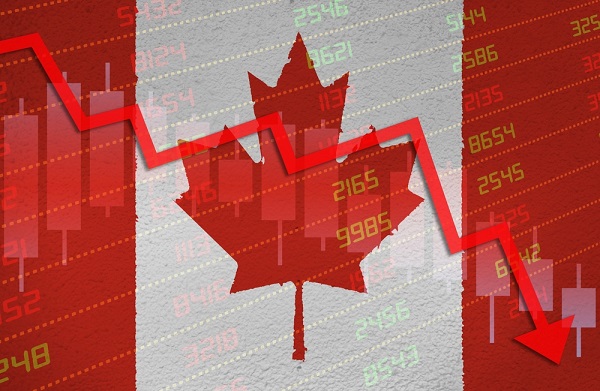Opinion
‘Secret’ RCMP memo blames everyone but the Liberals for Canada’s misery

From LifeSiteNews
By Kennedy Hall
This is, of course, about Canada’s Conservative leader Pierre Poilievre, a man whom the left has tried to turn into a Super Trump since the day he stood up against COVID totalitarianism.
According to the National Post, a “secret” RCMP report that warns of a potential revolt by Canadians, once “they realize how broke they are,” has been unearthed by way of an access to information request.
Secret RCMP report warns Canadians may revolt once they realize how broke they are https://t.co/7IW4gjmS8v pic.twitter.com/Dq8obMHPKl
— National Post (@nationalpost) March 20, 2024
The report begins: “A secret RCMP report is warning the federal government that Canada may descend into civil unrest once citizens realize the hopelessness of their economic situation.”
Now, before we get into the meat of the supposed predictions, I think we would be wise to look at the information with a certain interpretive key. Keep in mind that the RCMP has become a Liberal Party institution, and we needn’t look any further for proof of that than the disgraced former RCMP Commissioner Brenda Lucki, who was appointed by Trudeau and subsequently gave him a run for his money with how many scandals she was caught up in.
COVID, Russia, and climate change destroying the world
The report — heavily redacted and embedded at the bottom of the article — starts with a stunning statement. It reads: “The global community has experienced a series of crises, with COVID-19, supply-chain issues, and the Russian invasion of Ukraine all sending shockwaves throughout the world.” It goes on to say that the situation will “probably” get worse and the “early effects of climate change and a global recession” will only add fuel to the fire of the deterioration of Canada and the global community.
Note that this striking claim is presented as fact, without proof or evidence, and is the leading thought of the document. The report goes on to say: “The coming period of recession will … accelerate the decline in living standards that the younger generations have already witnessed compared to earlier generations.” It adds that “many Canadians under 35 are unlikely ever to be able to buy a place to live.”
So, the theme of the document is that the world, and Canada in particular, is going to hell in a hand-basket, and the reasons for that are primarily COVID, Russia, the climate, and not the government. How convenient! After almost a decade of Trudeau, a report surfaces when his popularity is in the sewer that blames everyone but him for the deciding state of the country he has done his best to ruin.
READ: Deputy PM Chrystia Freeland is championing ‘decarbonization’ at the WEF as Canada falls apart
Karl Marx and the conspiracy nuts
Tellingly, after hammering home the dire situation on the horizon — where it will be if the Liberals have their way — the document predicts that the coming dark age will be accelerated by “popular resentment” and “paranoid populism.”
Now, any astute reader of the news with right-leaning sensibilities will understand what those terms mean. “Popular resentment” is a dog whistle for a Marxist worldview that pits groups of people against one another in a “struggle” for prosperity. “Paranoid populism” is an abbreviation of “People who are involved in populist movements, like Donald Trump — and by extension Poilievre — supporters, are paranoid conspiracy nuts.”
The popular resentment section reads: “The fallout from this decline in living standards will be exacerbated by the fact that the difference between the extremes of wealth is greater now… than it has been at any time in several generations.”
Translation: The rich are lording over the poor, and the poor are poorer than they ever have been. Of course, there is some truth to this, as there is always truth to this in human society where there are always “haves” and “have nots.”
The section on paranoid populism then tellingly implies that those afflicted by populist paranoia will pounce on this struggle. It reads: “Capitalizing on the rise of political polarization and conspiracy theories have been populists willing to tailor their messages to appeal to extremist movements. Authoritarian movements have been on the rise…”
Amazing. According to this report, we are living in a Marxist moment where the proletariat is struggling for their survival against the bourgeoisie, and the real threat is the rise of a populist movement which appeals to extremists with conspiracy theories. Again, a liberal institution will put the blame for the apocalypse on anyone but liberals.
This is really about Poilievre
Now, if you were a betting man, who do you think the document is referring to, given that it is a Canadian document that has been conveniently released just when the Conservatives have threatened to topple the government with a non-confidence motion? This is, of course, about Conservative leader Pierre Poilievre, a man whom the left has tried to turn into a Super Trump since the day he stood up against COVID totalitarianism. Poilievre is far from a right-wing Christian hero — he holds views incompatible with Christian morality — but he is still enough of a populist and common-sense politician that he represents a mortal threat to the regime.
Is the Canadian economic situation bleak? Yes. Will it take a lot of work and common-sense governance to turn things around? Of course. And, again, Poilievre is not the savior, but the man can at least do proper math and understands what the average Canadian is struggling with. If he enacts any of his red tape removing policies, surely Canada will be able to start recovering. The Liberals cannot abide this, as they clearly want to destroy this nation.
It is clear by this point that the Liberal Party will be decimated in the next election, whenever that is, as every poll imaginable has them losing so many seats that they will be able to drive to work together in an airport shuttle van. And, since liberals are incapable of self-reflection and critical thinking, their only hope in their hopeless situation is to sound the alarm of the coming Canadian Armageddon and warn Canadians that it is everyone but they who are to blame, and the opposition will only burn the country down faster than a wildfire that was caused by conservative disbelief in climate change.
For my money, this “secret” document is nothing but a piece of propaganda from a desperate regime.
Business
Coffee price explosion a self-inflicted wound: Liberal tariff drives up cost of coffee

This article supplied by Troy Media.
Since March 3, Canadian importers have been paying an additional 25 per cent tariff on imported coffee. This counter-tariff, introduced as part of Ottawa’s retaliatory response to a trade dispute triggered by new United States duties on Canadian agricultural exports earlier this year, directly affects a product that isn’t even grown in Canada.
Coffee is up 19 per cent—and global markets aren’t to blame. Ottawa’s political posturing is burning your wallet, one cup at a time
Canadians are paying 19 per cent more for ground coffee this year—and it’s not because of global supply issues. It’s because of a self-inflicted policy
mistake: a 25 per cent tariff imposed by Ottawa on imported coffee, a product Canada doesn’t even grow.
Many consumers may attribute the spike to global market volatility, especially after coffee futures soared to a record high of more than US$4.40 per
pound in February. But that explanation no longer holds—futures have since dropped by more than 30 per cent, yet retail prices remain stubbornly high. So, what’s driving this divergence?
The answer lies, in part, in trade policy.
Since March 3, Canadian importers have been paying an additional 25 per cent tariff on imported coffee.
This counter-tariff, introduced as part of Ottawa’s retaliatory response to a trade dispute triggered by new United States duties on Canadian agricultural exports earlier this year, directly affects a product that isn’t even grown in Canada.
Unlike dairy or poultry, coffee has no domestic farming sector to protect. These tariffs aren’t shielding Canadian producers—they’re punishing
Canadian consumers and businesses.
To grasp the scale of this impact, consider the size of the industry. According to Introspective Market Research, retail coffee sales in Canada total more than $2.7 billion annually and are projected to grow steadily over the next decade. Meanwhile, coffee shops and quick-service restaurants, from Tim Hortons to independent cafés, generate an additional $6.4 billion per year. Tim Hortons alone sells more than five million cups of coffee per day.
This is not a fringe sector; it’s a critical part of both our economy and our culture.
Ironically, the U.S.—our supposed trade adversary in this case—doesn’t grow coffee either. Yet both countries are now entangled in a tariff tug-of-war that serves no practical purpose. The same logic applies to tea, which is also subject to retaliatory measures.
The tariffs were introduced under the Trudeau government in a broader geopolitical strategy that often felt more performative than pragmatic. Trudeau’s combative approach to trade, seemingly crafted on a whiteboard without regard for economic fallout, may have resonated politically, but it ignored basic economic principles. Consumers were never part of the equation.
In contrast, Prime Minister Mark Carney appears to be taking a more measured approach. Tariffs on U.S. alcohol and citrus products remain, but those can be sourced from other markets with relatively little disruption. Coffee and tea, however, are a different matter. There are no alternative domestic sources. The cost of these tariffs is being passed directly to roasters, grocers, restaurants, and ultimately, to the consumer.
Compounding the problem is the volatility of American trade policy under U.S. President Donald Trump, which continues to inject uncertainty into food markets. Tariffs come and go with the political winds, forcing companies to engage in “buffer pricing.” Much like travelers buying insurance for
unpredictable weather, companies build in extra costs to guard against political surprises. It’s effectively a tax on unpredictability, and it’s now embedded in the price Canadians pay at the till.
And while consumers might not feel the same pinch at their local café, where coffee is a smaller fraction of the total cost of a cup, the grocery aisle tells a different story. That’s where the full weight of these policies lands.
Whether a new trade agreement can be reached by the self-imposed July 21 deadline—or a damaging 35 per cent tariff Trump has set for August 1 can be avoided—remains uncertain. But what should be obvious is this: both Canada and the U.S. need to keep essential agri-food imports like coffee and tea out of their geopolitical fights.
Canada has a vibrant coffee ecosystem, built on roasting, innovation and consumer culture, not cultivation. There is no economic rationale for taxing it. Canadians shouldn’t be paying more for their morning brew just to send a symbolic message to Washington.
It’s time Ottawa led by example and scrapped these pointless tariffs.
Dr. Sylvain Charlebois is a Canadian professor and researcher in food distribution and policy. He is senior director of the Agri-Food Analytics Lab at Dalhousie University and co-host of The Food Professor Podcast. He is frequently cited in the media for his insights on food prices, agricultural trends, and the global food supply chain.
Troy Media empowers Canadian community news outlets by providing independent, insightful analysis and commentary. Our mission is to support local media in helping Canadians stay informed and engaged by delivering reliable content that strengthens community connections and deepens understanding across the country.
International
This ends now: Trump orders Bondi to unseal Epstein grand jury testimony

Quick Hit:
President Trump on Thursday directed Attorney General Pam Bondi to pursue the release of grand jury records in the Epstein case, saying “this SCAM…should end, right now!” Bondi said she’ll ask the court Friday to unseal the transcripts.
Key Details:
- Trump said on Truth Social he had asked AG Pam Bondi to release “any and all pertinent Grand Jury testimony” tied to Epstein, pending court approval.
- Bondi responded Thursday evening, posting, “President Trump — we are ready to move the court tomorrow to unseal the grand jury transcripts.”
- Trump’s directive comes just hours after The Wall Street Journal published a report about a birthday card he allegedly wrote to Epstein—an allegation Trump has called “fake” and vowed to sue over.
Diving Deeper:
President Donald Trump on Thursday took to Truth Social to instruct Attorney General Pam Bondi to pursue the release of sealed grand jury records. “Based on the ridiculous amount of publicity given to Jeffrey Epstein, I have asked Attorney General Pam Bondi to produce any and all pertinent Grand Jury testimony, subject to Court approval,” Trump wrote. He then added, “This SCAM, perpetuated by the Democrats, should end, right now!”
Bondi quickly responded on X, confirming her team would be in court Friday to make the request. “President Trump — we are ready to move the court tomorrow to unseal the grand jury transcripts,” she wrote.
The renewed push comes in the wake of a Wall Street Journal article published Thursday that alleged Trump sent a sexually explicit birthday card to Epstein in 2003. Trump strongly denied the claim, saying it was fabricated and promising to sue the paper for defamation.
Epstein, 66, was found dead in his Manhattan jail cell in August 2019, just a month after he was indicted by federal prosecutors in the Southern District of New York for sex trafficking minors. The official ruling was suicide, though skepticism remains widespread.
Last week, the FBI and Justice Department released the results of a long-awaited internal review. In an unsigned memo, federal officials concluded that Epstein did not have a “client list,” had not blackmailed any prominent figures, and that no further investigations into uncharged individuals were warranted. The DOJ memo said no additional disclosures would be made, effectively closing the book on the federal inquiry.
Trump, who has previously blasted the media’s obsession with Epstein, supported the memo’s findings and called the broader conspiracy a “hoax.” Still, pressure has mounted from Trump’s base and transparency advocates demanding public access to sealed documents and grand jury proceedings.
While hundreds of pages of testimony from Epstein’s 2006 Florida case were released last year, including disturbing details from victims as young as 14, the New York proceedings remain largely sealed. That Florida case ended in a controversial plea deal that saw Epstein serve just 13 months in a county jail.
With Bondi now preparing to formally request the unsealing of federal transcripts in New York, Thursday’s developments could signal a shift toward more transparency—though any release will still require approval from the court.
-

 Energy2 days ago
Energy2 days agoIs The Carney Government Making Canadian Energy More “Investible”?
-

 Business2 days ago
Business2 days agoCompetition Bureau is right—Canada should open up competition in the air
-

 Immigration2 days ago
Immigration2 days agoUnregulated medical procedures? Price Edward Islanders Want Answers After Finding Biomedical Waste From PRC-Linked Monasteries
-

 Business2 days ago
Business2 days agoDemocracy Watchdog Says PM Carney’s “Ethics Screen” Actually “Hides His Participation” In Conflicted Investments
-

 Business2 days ago
Business2 days agoIt’s Time To End Canada’s Protectionist Supply Management Regime
-

 COVID-192 days ago
COVID-192 days agoFreedom Convoy leaders’ sentencing hearing to begin July 23 with verdict due in August
-

 Addictions2 days ago
Addictions2 days agoAfter eight years, Canada still lacks long-term data on safer supply
-

 National2 days ago
National2 days agoLiberals push to lower voting age to 16 in federal elections







